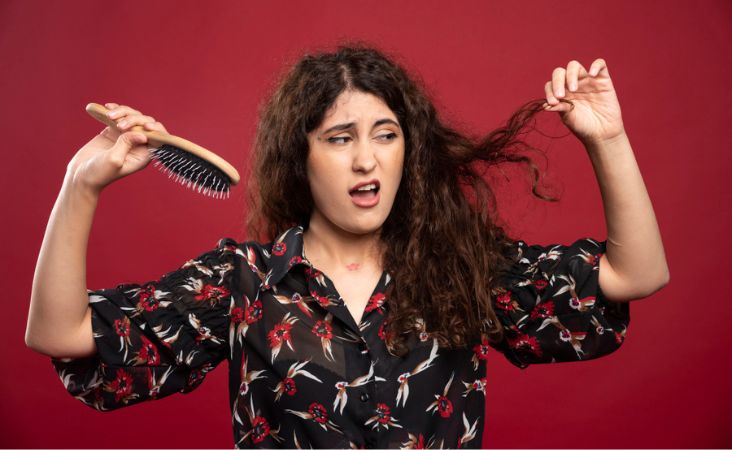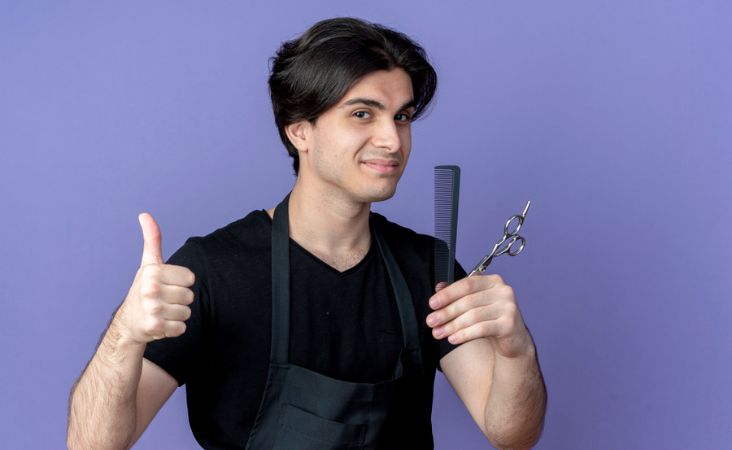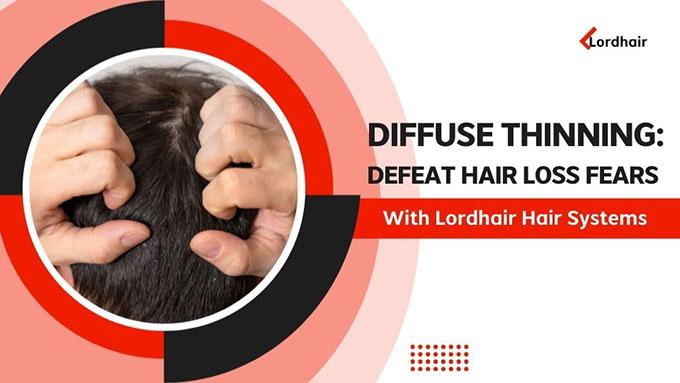Hair Staticky in Winter: Causes, Hair Loss Connection, and How to Stop It
- Written by Vivek Khullar
- | Published Mar 13, 2024
- |
- 7 min read
 Listen to the full text
Listen to the full textWinters. The season of cosy blankets, hot coffee, and bundling up in layers. But winters aren’t just about little joys. The pains come along with it, and staticky hair is one of them. Also known as static hair, the condition makes the hair look like they have a life of their own. There’s also a lot of talk about staticky hair causing hair loss but is it really true? And if it is, how do you stop it?
Lordhair - a leading supplier of hairpiece toupees and women's wigs - is here to give you all the answers on staticky hair. We’re going to dive into everything you need to know about staticky hair in the winters including causes, hair loss connection, and remedial measures.
So, let’s get started by understanding what exactly staticky hair is.
What is Staticky Hair?
When hair rubs against a rough surface and stands up, becomes frizzy, or sticks to other surfaces, the phenomenon is known as static hair. Think of those times you've rubbed a balloon on your hair and watched as it magically attracted strands to it. That's static hair in action!
According to dermatologists, this phenomenon is particularly noticeable in winter. So, what causes this hair-raising experience? Keep reading to find out more.

What Causes Static Hair?
Staticky strands happen when they pick up an electrical charge, making them stand out and look unruly. It's like your hair is magnetized, causing individual strands to repel each other and stand on end. It is more common in the winter months due to low humidity levels and the friction caused by sitting and sleeping in blankets or wearing hats and scarves.
When the air is dry, there's less moisture to help neutralize the electrical charge. This leaves your scalp hair prone to static. Additionally, materials like wool and synthetic fibers can exacerbate the problem by generating even more friction. The result? A frustrating case of hair that seems impossible to tame.
Is There a Connection Between Staticky Hair and Thinning?
Many people wonder whether there's a connection between having statice hair and experiencing hair loss. We believe that it's a valid concern, considering how unsettling it can be to see some hair strands standing on end. However, staticky hair itself isn't a direct cause of hair loss.
Instead, the link between the two lies in the underlying factors that contribute to each condition. As we said before, staticky hair is primarily a result of friction and a lack of moisture in the air. During the winter months, when humidity levels drop and we're more likely to wear hats and scarves made from materials like wool or synthetic fibers, friction between these materials and our hair can generate static electricity.
As a result, individual hair strands repel each other, leading to that characteristic “staticky” appearance. Hair loss, on the other hand, can be caused by a variety of factors including genetics, hormonal changes, medical conditions, and lifestyle choices.
While staticky hair itself doesn't directly cause hair loss, some of the habits associated with managing staticky hair can weaken strands. These include excessive brushing and harsh styling products. Habits like these can potentially contribute to hair damage or breakage over time. Additionally, if staticky hair leads to increased hair manipulation or pulling in an attempt to control it, this could exacerbate existing hair loss issues.
Furthermore, the winter environment that often triggers staticky hair (specifically, cold temperatures and low humidity) can also affect the health of your scalp and hair follicles. We all know how cold weather dries out the scalp. What some of us don’t know is that it also leads to itching, flakiness, and potential damage to the hair follicles.
Some dermatologists also state that decreased blood flow to the scalp in colder temperatures may impact hair growth cycles. So, while staticky hair itself isn't a direct cause of hair loss, the conditions that contribute to staticky hair can potentially worsen existing hair loss issues or contribute to hair damage if not properly managed.
It's essential to take steps to minimize static and protect your hair and scalp during the winter months to maintain overall hair health. So, what measures should you be taking to stop static hair? Well, let’s talk about them in our next section!
Make sure to check out these sources as well:
Here’s the answer to why am I balding
Does the keto diet cause hair loss and damage?
Winter hair care tips for natural and toupee hair
What Problems Does Static Hair Cause?
Static hair can be a nuisance. It can cause various problems that can affect your hair’s appearance and overall health. Here are some reasons why static hair can be problematic:
1 Unruly appearance
Staticky hair can give your hairstyle a dishevelled and unkempt look. Instead of lying flat, individual strands will stand on end, creating a chaotic and messy appearance. This can be particularly frustrating when you've spent time styling your hair only to have it ruined by static.
Whether you're heading to work or a special event, dealing with unruly static hair can dampen your confidence and self-esteem.
2 Frizziness
Static electricity exacerbates frizz by causing individual hair strands to repel each other. Result? A frizzy and untamed appearance. This especially becomes a problem for those with naturally curly or wavy hair textures. Frizzy hair lacks smoothness and can feel rough to the touch, making it difficult to manage and style.
Additionally, frizz can be more pronounced in dry or humid weather conditions, further contributing to the frustration of dealing with static hair.
3 Breakage
The friction caused by staticky hair rubbing against clothing or other surfaces can lead to hair breakage. According to dermatologists, when our hair becomes statically charged, it becomes more susceptible to damage especially if it's already weakened or fragile.
Over time, repeated friction and breakage can result in noticeable thinning and loss of hair volume. This can be particularly concerning for individuals with already delicate or compromised hair strands as static-induced breakage can further exacerbate existing hair loss issues.
4 Lack of shine
Yes, you read it right! Static hair tends to lack shine and appear dull when compared to healthy, moisturized hair. Why, you ask? Well, because static electricity disrupts the hair's outer layer. This causes hair to lose its natural luster and reflectivity. What’s more, lack of shine not only affects the aesthetic appeal of your hair but also indicates potential damage and dehydration.
5 Difficulty styling
Love styling your hair? That’s good. But do you know that static hair can be challenging to style as it refuses to stay in place? Instead of cooperating and holding the desired shape, staticky hair tends to fly away and resist manipulation. This can make it frustrating to achieve your desired hairstyle, whether you're trying to create sleek and polished looks or more intricate updos.

How to Stop Hair from Being Staticky in Winter?
To combat staticky hair during the winter months, try implementing these strategies:
1 Hydrate your hair
As we said before, dry winter air can strip moisture from your hair, making it more prone to static. To combat this, opt for hydrating shampoos and conditioners that replenish moisture and nourish your strands. Look for products formulated with ingredients like glycerin, which helps attract and retain moisture, or coconut oil. These are known for their hydrating properties.
Regular use of these products will help keep your hair hydrated, reducing the likelihood of static buildup. Additionally, consider incorporating weekly deep conditioning treatments or hair masks into your routine to provide an extra boost of moisture.
By keeping your hair well-hydrated, you can create a protective barrier against static electricity and maintain healthy, manageable locks throughout the winter.
2 Use a humidifier
Indoor heating systems that we use during systems can create dry environments that exacerbate staticky hair. Adding a humidifier to your home can help replenish moisture in the air, preventing your hair from becoming overly dry and prone to static. Place the humidifier in rooms where you spend the most time (such as your bedroom or living room) to maximize its effectiveness.
Aim to maintain indoor humidity levels between 30-50%. This range is ideal for keeping your hair and your scalp skin hydrated and comfortable. By using a humidifier, you'll create a more balanced indoor environment that supports healthy hair and reduces static electricity.
3 Avoid over-drying
There we said it! Heat-styling tools like blow dryers and flat irons can further dehydrate your hair, leading to increased static and damage. Whenever possible, allow your hair to air dry naturally to minimize exposure to heat and prevent moisture loss.
Even if you want to use heat-styling tools, opt for a lower heat setting and apply a heat protectant spray beforehand to minimize damage. Additionally, limit the frequency of heat styling and give your hair regular breaks to recover and restore moisture. By being mindful of how you dry your hair, you'll help maintain its natural hydration levels and reduce the risk of static buildup.
4 Choose the right hairbrush
Another important tip for stopping staticky hair in 2024! The type of hairbrush you use can impact static electricity and hair health. Opt for brushes with natural bristles or a combination of natural and synthetic bristles. That’s because these materials are less likely to generate static compared to plastic or metal brushes.
Wooden or antistatic combs are also excellent alternatives for gently detangling hair without causing friction or static buildup. When brushing your hair, start from the ends and work your way up to prevent breakage and minimize static.
By choosing the right hairbrush, you'll effectively detangle your hair while reducing static and maintaining its smoothness and shine.

5 Moisturize with leave-in products
Incorporating leave-in conditioners or hair serums into your routine can provide an extra layer of moisture and protection against static. Apply a small amount of product to damp or dry hair, focusing on the mid-lengths and ends where moisture is most needed.
Look for products containing ingredients like argan oil, jojoba oil, or silk proteins. These will help smoothen hair cuticle and reduce friction. Leave-in products will not only hydrate and nourish your hair but also provide a barrier against static electricity. They will keep your locks smooth and manageable throughout the day.
6 Static-control products
There are many anti-frizz sprays or hair-finishing serums available in the market that are specifically designed to combat static. These products often contain ingredients like silicone or polymers that help neutralize static electricity and provide a sleek, polished finish.
To use, simply spray or apply a small amount of product onto your hair, focusing on areas prone to static (such as the crown and ends). By incorporating static-control products into your styling routine, you'll minimize static buildup and achieve a flawless, frizz-free look all winter long.
What if Hair Loss Still Persists?
Alright, let's be real here! Even if you've tried all the treatments mentioned for combating staticky hair, you might still find yourself dealing with hair loss. Remember, we've already established that this issue and hair loss aren't directly linked, right? So, what's the next step? Our top recommendation is to schedule a visit to a dermatologist and discuss your hair concerns thoroughly.
While they kickstart your journey towards hair recovery, consider exploring hair replacement systems and wigs for women. After all, the recovery process can span several months. Just like real scalp hair, non-surgical hair units offer the confidence and natural look you desire. So, while you work on restoring your hair health, these systems can serve as an effective solution to maintain your appearance and self-assurance.
Since some of you must be thinking, ‘wait, what exactly is a hair system?, it's a convenient and efficient way to regain a full head of hair without undergoing invasive surgery.
Hair systems are crafted using top-notch materials for both the base and the hair itself. They are designed to be comfortable, durable, lightweight, and breathable, ensuring a natural look and feel. Unlike traditional wigs which can be bulky and obvious, modern hair systems seamlessly blend with your natural hairline. They offer a discreet and undetectable solution.
Check out how amazing Juha looks after buying one of our hair systems:
Static Hair in Winter: Final Words
There you go!
We've covered everything you need to know about managing hair staticky in the winter season. Remember, dealing with staticky strands can be a frustrating issue but it's not something you have to live with. By following the aforementioned tips and strategies, you can effectively combat static and maintain healthy, beautiful hair all year round.
Whether you're dealing with staticky hair, hair loss, or both, it's essential to take proactive steps to address the underlying causes and seek professional guidance when needed.
And if you're considering hair replacement systems as a solution for persistent hair loss, look no further than Lordhair. With superior quality and innovative base designs, our hair systems offer a natural-looking and comfortable solution to restore your confidence and reclaim your hair.
Contact us in case of queries.



